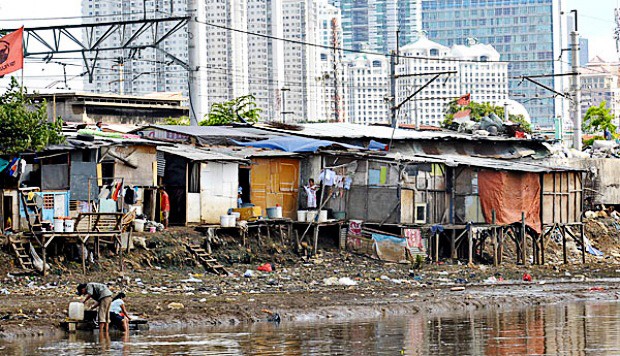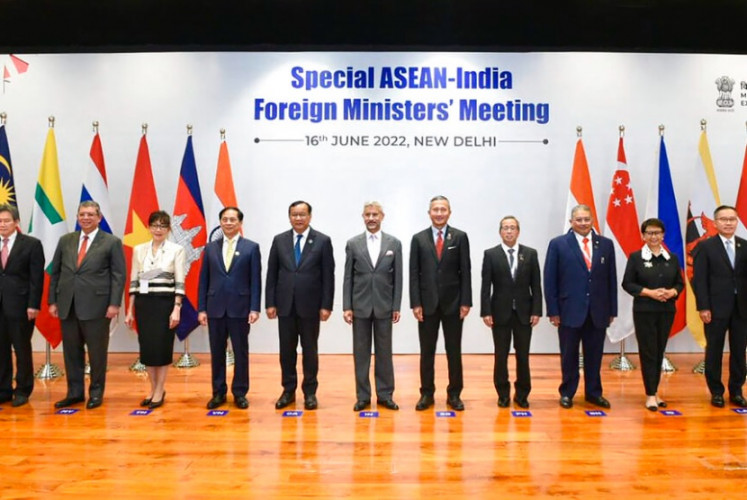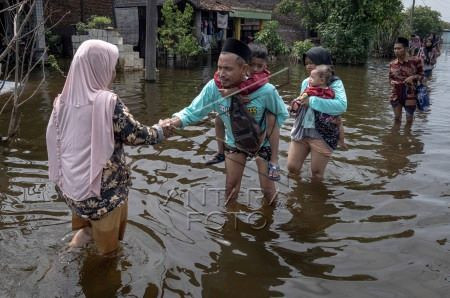Urbanization in Asia: Double edged sword?
Evidence from the Asian pacific region suggests that ‘most of the cities are now hubs of economic growth and wealth creation’. It is also claimed that the ‘booming’ urban economy has lifted millions out of poverty in the region. For instance, industrial centers in Jakarta, Manila and Bangkok provide employment and economic access to several thousand and most Asian cities rank well in the ‘cities of opportunity’ global index.
Change Size
 Water ways: Local people draw water from a dirty river in a slum area of Jakarta. (Tempo/-)
Water ways: Local people draw water from a dirty river in a slum area of Jakarta. (Tempo/-)
F
or many in Asian countries, the city is the ‘New Deal’. The city is where aspiration and opportunities meet, the platform that offers the opportunity to climb the ladder both socially and economically and even shape one’s ability to support those below. Job opportunities, educational institutions, social services and transport, and modern consumerist lifestyle. From Beijing to Seoul, Jakarta to Tokyo and Manila to Bangkok, the city offers all these deals, to the thousands and millions that live in or move into them each year.
Yet, the city can be brutal. It can be exclusive and can turn into ‘hell’ for the poor urban majority. Call it urbanization and urban growth at work.
This is the theme of UN Habitat’s recent Asian and Pacific Cities Report. The report offers deep insight into the already known fact that Asia is experiencing rapid urban population growth and a significant level of urbanization.
Asia constitutes about 55 percent of the world’s urban population and an urbanization rate of 1.5 percent. By 2018, the population of Asia is expected to be more than 50 percent urban.
Indeed, a recent World Bank report revealed rapid change in urban expansion and even more critically, that urban population far exceeds urban land expansion in East Asia. Even more, aside the 17 mega cities (population of more than 10 million) in the region, the fastest rate of growth is occurring in small and medium size urban areas, where human, financial and organization resources are woefully inadequate. The statistics are startling.
So why does this matter? As the UN Habitat report indicates, it is time to move from ‘quantity’ to ‘quality’. In other words, turn the numbers into quality, positive urban experiences. However, as recently noted in the urbanization and development debate—urbanization can propel economic growth and development.
Evidence from the Asian pacific region suggests that ‘most of the cities are now hubs of economic growth and wealth creation’. It is also claimed that the ‘booming’ urban economy has lifted millions out of poverty in the region. For instance, industrial centers in Jakarta, Manila and Bangkok provide employment and economic access to several thousand and most Asian cities rank well in the ‘cities of opportunity’ global index.
Yet, it is important to underscore, another, if not more important, part of the entire picture. As Mitlin and Patel argue, though economic growth continues to transform many of the cities in the Asia pacific, many, if not the majority, are excluded. Even though poverty has reduced over the years, inequality and poverty is still high and many are in the vulnerable, low-wage earning informal sector.
In addition, the report mentions that less than 75 percent of the urban population has access to improved sanitation. Rising cost of living, inadequate affordable housing and lack of meaningful income has had led to the socio-spatial manifestation of informal settlements (or slums)— ubiquitous for all to see.
More problematic is the environmental and climate risk in the region, with far reaching health implications. Severe levels of air pollution, organic pollution of water bodies, sanitation concerns and CO2 emissions are prime. The threat of disasters, including flooding, still remain among the broader issues of urban resilience and livability.
So, is the future of cities and urban areas in the Asia-Pacific a sort of a ‘double-edge’ sword scenario of ‘boom’ and ‘gloom’; good and bad—an ‘urban divide’?
Herein lies the miracle of urban governance. Turning the tides of urbanization into positive, quality living experience for all urban residents, in both large and small areas, requires urban innovation. Bringing to the center collaborative governance, that gives communities and civil society the possibility to take part in planning and urban development decisions through accountable, transparent, inclusive and responsible institutional frameworks.
Governance, not government, that includes the process of believing in a change in the modus operadi, the proper role and resources for local governance beyond partisan and ethnic politics and shared responsibility to create sustainable changes.
Accepting the poor as not merely a representation of poverty, but fellow humans who posses the capabilities and latent potential to contribute to and positively shape their living environments if given the necessary support and space.
In the end, joining ends into a responsible and dutiful circle—of public sector, civil society, private agencies and citizens—to make things better. The future is bright but it may require ‘bright’ innovation in inclusive governance and ‘shared prosperity for all’.
***
Seth is a Development Planner and currently a MEXT PhD Scholar at Osaka University, Japan. He holds an MSc Urban Planning and Policy Design from the Politecnico di Milano, Italy and Crises Management and Disaster Response certificate from BBK Academy Germany. Seth Asare Okyere was also the recipient of the Konosuke Matsushita Memorial (Panasonic) Foundation young researcher grant Award in 2015. His professional and research interests are in the areas of urban development and policy and informal urbanism.
---------------
We are looking for information, opinions, and in-depth analysis from experts or scholars in a variety of fields. We choose articles based on facts or opinions about general news, as well as quality analysis and commentary about Indonesia or international events. Send your piece to community@jakpost.com.








